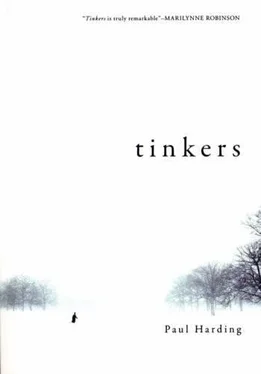When the ice went out the next year, Howard took his pipe from its drawer in the wagon and rubbed it across the thigh of his pants and blew into the bowl and put it in his jacket pocket. He made up a bundle of Gilbert's supplies and hiked along the Indian trail. There was no sign of the hermit. Howard made the hike every day for a week, but Gilbert never appeared. On the seventh day, Howard turned off the trail and sat by the river and smoked a pipeful of the tobacco that he had packed for the hermit. As he smoked, he listened to the voices in the rapids. They murmured about a place somewhere deep in the woods where a set of bones lay on a bed of moss, above which a troop of mournful flies had kept vigil the previous autumn until the frosts came and they, too, had succumbed.
This is a book. It is a book I found in a box. I found the box in the attic. The box was in the attic, under the eaves. The attic was hot and still. The air was stale with dust. The dust was from old pictures and books. The dust in the air was made up of the book I found. I breathed the book before I saw it; tasted the book before I read it. The book has a red marbled cover. It has large pages. The pages are made of heavy paper the color of blanched almonds. The book is filled with writing. The writing is in blue ink. The ink is heavy and built up in places the way paint builds up on canvas. The paper did not absorb the ink. The ink had to dry before the book was closed or a page turned. The blue of the ink is so dark that it looks black. It is only in flourishes tailing off of serifs or in lines where the hand lessened its pressure on the pen that you can see the blue. The handwriting looks like yours. It looks like you wrote the book. It is a dictionary or an encyclopedia of some sort. The book is full of reports from the backs of events, full of weak, cold light from the north, small constructions from short summers. Let me read you an example. Are you comfortable? Do you want the bed down a little bit more? Would you like some water? No; every one else is asleep. Shall I read you an example? You don't remember writing this? The handwriting looks very much like yours. Very much like mine, too, with the f's that look like elongated s's with dashes through their middles. And the mix of script and printing. Why don't I start at the beginning, with the first entry? No, I'm Charlie. Sam is at our mother's getting some sleep. No, I don't think he smokes anymore, no. Not since he got pneumonia last winter. Yes, we sure have; we've always had family no matter what. This first one is
Cosmos Borealis: Light skin of sky and cloud and mountain on the still pond. Water body beneath teeming with reeds and silt and trout (sealed in day skin and night skin and ice lids), which we draw out with silk threads, fitted with snags of fur or bright feathers. Skin like glass like liquid like skin; our words scrieved the slick surface (reflecting risen moon, spinning stars, flitting bats), so that we had only to whisper across the wide plate. Green drakes blossomed powder dry among the stars, glowing white, out of pods, which rose from the muck at the bottom of the pond and broke open on the skin of the water. We whispered across the galaxies, Who needs Mars?
What is it like to be full of lightning? What is it like to be split open from the inside by lightning? Howard used to imagine that it was like the rupture of a fit. Although he never remembered them, he had the sense that, although there was cold before and chills after, during his seizures his blood boiled and his brain nearly fried in its skull pan. It was as if there were a secret door that opened on its own to an electric storm spinning somewhere out on the fringes of the solar system. He imagined the door. Closed, it was invisible, cloaked in the colors of the world (it was outside; it moved). Open, it was made of thick plain oak and swung outward. It had a wooden knob because the electricity on the other side would erupt from a metal handle. Howard often wondered if there was a knob on the outside of the door. In his mind, he could not see if there was because the door was either closed and hidden or flung open, so that the front, the side painted in light and shadow, grass and water, faced the opposite direction. The opened doorway framed an unbounded darkness. There was the black of the universe surrounding a pinwheel of light. Needles of electricity forked out of the whirlpool of sparks. Most of this lightning flashed and was gone in an instant. But when one of the charges found its way through the door and into Howard, it stuck fast; it latched onto something inside of him and held and held. In the cold, blasted, numb hours following a seizure, confusion prevailed; Howard's blistered brain crackled and sparked blue behind his eyes and he sat slumped, slack-jawed, blanket-wrapped, baffled by his diet of lightning. It was as if some well-intending being desired to give him a special gift and spoon-fed him the voltage from behind the door. No, not being, even. There was the door, or maybe the doors, or maybe not even doors, just the curtains and murals of this world and the star-gushing universe was usually obscured by them-the curtains and the murals-and Howard, by accident of birth, tasted the raw stuff of the cosmos. Other, larger, inhuman souls might very well thrive on such a feast. Howard thought angels, but the image he had of the seraphim, with their long blond curls and flowing white robes and golden halos, did not fit with the more frightening, dark, powerful species he conjured, which would gorge on and delight in what, when ingested by him, instead of sating, instantly burst the seams of his thin body. The aura, the sparkle and tingle of an oncoming fit, was not the lightning-it was the cooked air that the lightning pushed in front of itself. The actual seizure was when the bolt touched flesh, and in an instant so atomic, so nearly immaterial, nearly incorporeal, that there was almost no before and after, no cause A that led to effect B, but instead simply A, simply B, with no then in between, and Howard became pure, unconscious energy. It was like the opposite of death, or a bit of the same thing death was, but from a different direction: Instead of being emptied or extinguished to the point of unselfness, Howard was overfilled, overwhelmed to the same state. If death was to fall below some human boundary, so his seizures were to be rocketed beyond it.
Perhaps, Howard thought, the curtains and murals and pastel angels are a mercy, a dim reflection of things fit for the fragility of human beings. Whenever he looked at the angels in the family Bible, though, he saw their radiant golden halos and resplendent white robes and he shook with fear.
Ninety-six hours before he died, George said he wanted a shave. He was a fastidiously neat dresser. His jackets and shirts were always well tailored, if not made from the best cloth or in the latest fashion. Whiskers grew on his face in mangy patches; he could not have grown a beard or mustache had he ever wanted to. This made shaving all the more important to him. If he went a day without shaving, his babyish face, dotted with sparse stubble, lent him the look of an invalid or a large child incapable of taking care of his own needs.
Jesus, when was the last time I had a shave? How about a shave? He looked around the room at his family. There were his wife, his two daughters, Claire and Betsy, a smattering of grown-up grandchildren, and his one remaining sister, Marjorie, huffing for air, fitted with a thick neck collar for her latest case of whiplash. The collar was zipped into a sock of tan linen, which matched her pantsuit. Despite lifelong asthma, she smoked long ladies' cigarettes on the back porch, flicking the ash off with her thumb, her arms crossed, her breath coming in sibilant little puffs of blue smoke. She kept her package of cigarettes in a cloth case with a gold-colored clasp. The case was embroidered with tan beads set in fountaining water patterns. She heard her brother as she pitched her cigarette into the rhododendron bushes and came back into the room. The screen door slammed behind her, the bang impious in the dim funereal hush. (The morning George had gone to the hospital, feeling worse than usual, his plan for the day had been a trip to the hardware store to buy a new hydraulic arm for the door; the old arm no longer offered any resistance.)
Читать дальше












